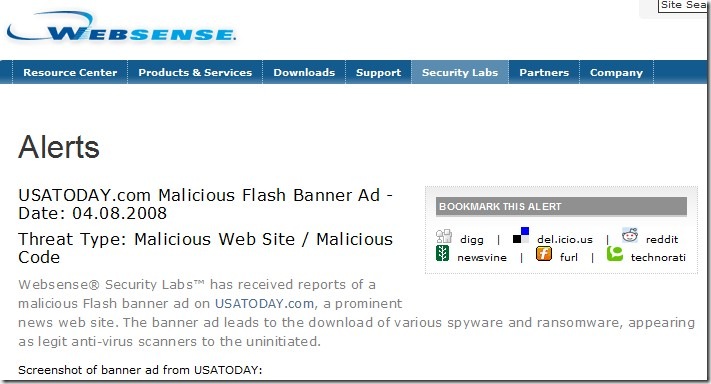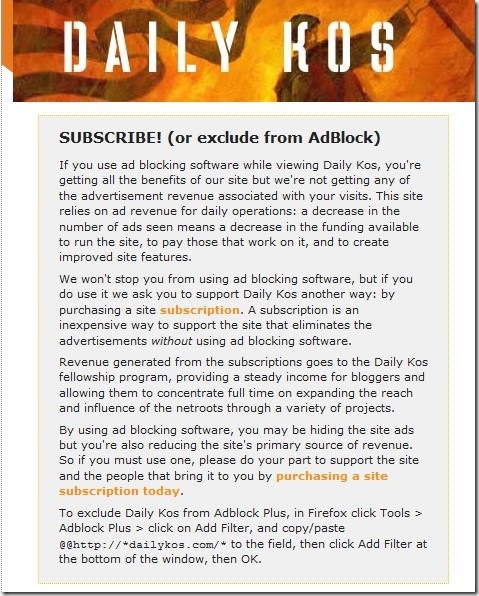Sunday, August 03, 2008
Newspaper meltdown 7: The Web holds no salvation, with ad blockers proliferating
by Larry Geller
In a previous post I mentioned Daily Kos as a news source. I went there to snip a clipping this morning, and found this at the top of their home page today:
Yes, reality is setting in for ad-supported websites. Here is a very major, very popular, website begging for subscriptions as their business model shows signs of collapsing.
If visitors to their website did not know about ad blocking software before, now their curiosity is aroused. Will anyone using AdBlock Plus do as they suggest and unblock their ads? Why would they?
So for those Daily Kos readers who were not already blocking ads, pretty soon they’ll join the multitudes who do. Good work, Daily Kos! You’ve possibly stabbed yourself in the back.
How will this website and others survive? The “purchase a subscription, pretty please” model may not work either.
Is it unfair to block ads? I don’t think so, despite loud protests from those who depend on them. When our Sunday paper arrived this morning, the first task was to “shuck” it, that is, take all the inserted ad sections and throw them away. They are not supposed to go into the recycle bin, so it’s straight to the landfill I suppose. We can read through them or not, but the choice is ours.
Since TV remotes have a fast-forward button, I have a constitutional right to push it and skip those obnoxious ads if I wish (does anyone watch live TV anymore? If so, you’re stuck, but thanks for watching the ads, someone has to).
Yes, no one can make me read print ads or chain me to a chair to watch stupid TV commercials. So I have no problem clearing the ad clutter from my computer screen. In fact, I deeply resent how pop-ups used to interfere with using a web browser. Reaction to pop-up ads was swift, and anyone still suffering from them might consult with any teenager on how to get rid of them. Updated browsers usually include pop-up ad blockers automatically.
Ad blocking is very easy. There are simple methods that involve nothing more than clicking to add Ad Block Pro to your FireFox browser.
There are commercial programs that promise to clean any kind of ad from your system. Here is a snippet from a non-free software program that I have no experience with and so I won’t name it, but just read this:
The program blocks over 1,000,000 major spyware applications, sponsored search-engine ads, and Gmail-sponsored links, and it includes advanced privacy cleaning and automatic updates, so the product is never outdated. Super Ad Blocker provides detailed statistics for the number and type of ads blocked. The application plays a fun sound when an ad is blocked to celebrate your victory. The scanner features a kernel level driver designed to help detect and remove 'rootkit' style infections. The ad-blocking now blocks IntelliText ads that appear on Web pages as double underlined words that show a window when hovered over.
Imagine… it even plays a “fun sound” when blocking ads. You see why I don’t want to name this program, but it makes my point. It also makes another—if you click on an ad, you’re opening the possibility of an unwanted program running in your browser. It could be spyware. So ad blockers also may be justifiable as a worthwhile addition to your security defenses.
This is no joke. In April, visitor’s to Gannett’s USA Today website who clicked on a Flash banner ad could have had spyware installed on their system:

For geeks only
I’ve had some email requests for info on the “geeky” methods of ad blocking that I mentioned in an earlier post. In addition to blocking ads, these methods protect against malware that might be installed from blocked sites. No ads, no problems.
Ad blockers may be “kernal level drivers” as in the above program, which effectively “disappear” the ad site completely from your computer’s consciousness or they may simply prevent ads from displaying. Or they may rely on a built-in feature of both Windows and Mac operating systems that makes known ad and malware sites unreachable by your computer without the need for buying any extra programs.
If you really are a geek and are comfortable with exploring your system, take a backup to be safe and check out one or more HOSTS file managers. These programs are free, and they are fiendishly effective. The HOSTS file can contain a list of sites you don’t want to fetch anything from. It’s simple, and works for all browsers. There are several pre-prepared lists that include the majority of ad-serving websites.
One of the oldest is Hostess. It lets you edit the block list, and add your personal sites to block local ads.
HostsMan is another and very popular program. I have no experience with it (being an older geek, I was raised on Hostess). This program automatically checks for the latest HOSTS file updates and should be a winner. It looks like the better choice. It checks multiple sources of information and even eliminates duplicates in the database. Kiss your ads goodbye if you have this one. There are several others besides these two.
If your Internet Explorer or other browser puts an ugly message in the space where an ad was, you can get rid of it with one more geeky program, eDexter. This is also a very old, established program. All it does is substitute nothingness, a picture of your choice, or maybe a tiny pink line where the ad should be. Their web page also has more info on the HOSTS file than I can include here.
Some anti-virus programs have expanded to include anti-spyware, firewalls, and now ad blocking. You may already have that capability in your security software, although it wouldn’t be as comprehensive as the two programs I’ve mentioned. On the other hand, you needn’t be a geek to use them.
For those of you with Windows Media Center, there is excellent commercial-skipping software. That’s off-topic for this article, but it reinforces my contention that skipping ads and commercials is a legitimate national pastime. And something that ad-based business models should be concerned about. No fast-forwarding needed, the software just sucks the ads out of the program like magic.
I firmly believe that we could be headed for a new paradigm. At least, the old one may disappear slowly.
I could be wrong. The crystal ball is still fuzzy, but squinting hard as I can, I don’t see any ads in it at all.
I don’t get it Larry- can the web site tell if you are blocking their ads? I always assumed not but this indicates they can tell. And if they can tell can’t they just block you from viewing their web site if you block the ads? But if they can’t tell if you are blocking ads why would they get less revenue since it’s based on the number of hits the site gets
I am not an expert on this, Andy, but I believe that a website cannot tell if the adblocker fetches the ad but doesn't display it.
If the web page designers wish, they can tell, with some difficulty, that ads have not been fetched. The HOSTS method works that way. The URL of common ad servers are placed into your HOSTS file, and when those URLs appear in a page, your computer will simply ignore them. They won't be requested. This is how the same programs protect you against malware--should an evil URL be in your HOSTS file, your computer will not go there.
I visited one website several months ago -- exactly one, never another -- that displayed a page admonishing me for using an ad blocker and instructing me to turn it off if I wanted to go farther. Needless to say, I just went somewhere else. I can't remember what that website was about, but it wasn't worth doing anything special just to see what might be behind the arrogant demand.
Web surfers wanting to avoid being assailed with ads will do that, if confronted. At least, I believe they will. It remains to be seen how this goes.
Well if they can tell then there’s nothing wrong with Kos’ post. But otherwise they are lying like a Bushie. If they can’t tell and are claming that they can and so are losing revenue because their advertisers DO know how many people aren’t viewing it – so aren’t paying them as much on a case by case basis- then they are engaging the exactly the kind of behavior they rail against.... promoting a lie to enhance their personal or corporate gain
<< Home




Post a Comment
Requiring those Captcha codes at least temporarily, in the hopes that it quells the flood of comment spam I've been receiving.